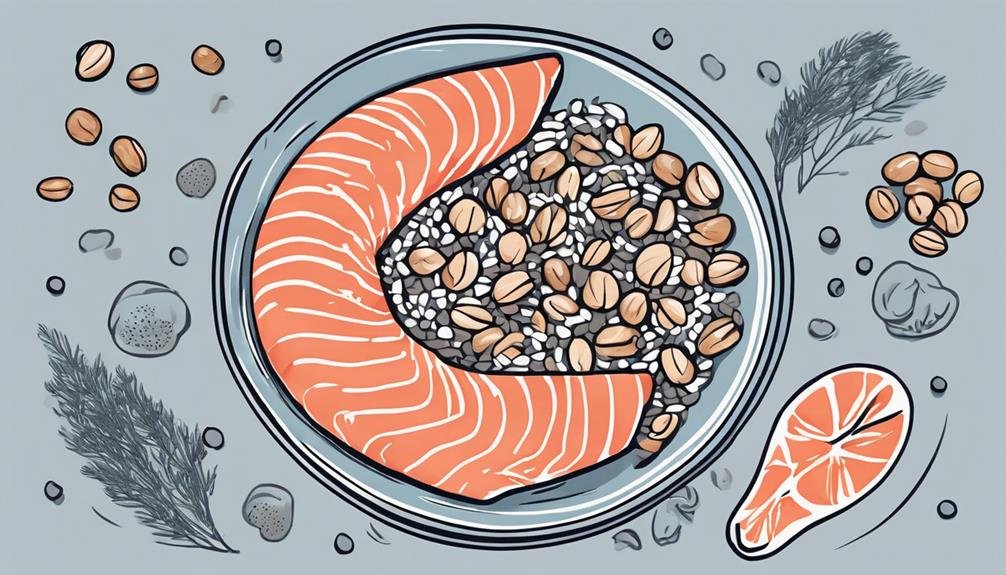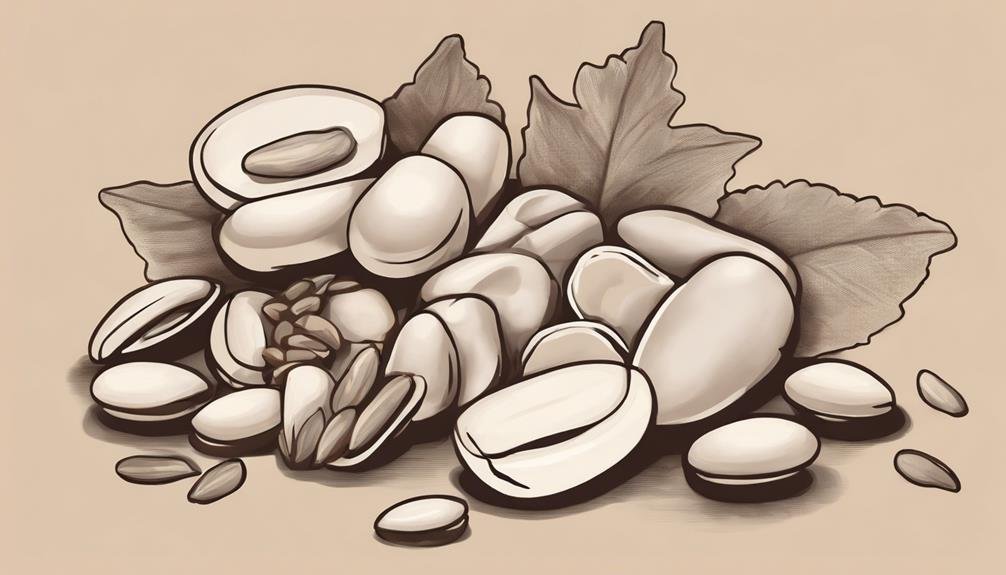7 Best Micronutrients for Men's Health After 40
As you navigate life after 40, prioritizing key micronutrients can greatly enhance your health and vitality. Focus on Vitamin D for bone strength, Omega-3 fatty acids for heart and brain health, and magnesium for energy and muscle function. Zinc supports testosterone levels, while Vitamin B12 boosts energy and brain health. Selenium offers immune support and antioxidants help combat oxidative stress. Including these micronutrients in your diet can elevate your overall well-being. Curious about how to incorporate these into your meals? You'll find some practical tips and further insights just ahead.
Key Takeaways
- Vitamin D: Essential for calcium absorption and bone strength; low levels can lead to muscle weakness and increased osteoporosis risk.
- Omega-3 Fatty Acids: Supports heart and brain health; reduces inflammation and enhances mood, particularly beneficial for men over 40.
- Magnesium: Vital for muscle function and energy production; helps improve sleep quality and reduces stress.
- Zinc: Important for immune function and testosterone levels; low zinc can lead to fatigue and decreased libido.
Vitamin D
Vitamin D plays an essential role in maintaining your overall health, especially as you age past 40. It helps your body absorb calcium, which is critical for strong bones.
As you grow older, your skin's ability to produce vitamin D from sunlight decreases, making it important to get enough through diet or supplements. Low levels of vitamin D can lead to muscle weakness, fatigue, and an increased risk of osteoporosis.
You'll want to include foods rich in vitamin D, such as fatty fish, fortified milk, and egg yolks, in your diet. Regular sun exposure can also boost your levels.
Monitoring your vitamin D status with your healthcare provider guarantees you maintain ideal levels for overall well-being.
Omega-3 Fatty Acids

Incorporating omega-3 fatty acids into your diet can considerably enhance heart and brain health, especially for men over 40. These essential fats play a significant role in reducing inflammation, improving mood, and supporting cognitive function. You can find omega-3s in fatty fish, flaxseeds, and walnuts. Aim for a balanced intake to reap the benefits while considering supplements if necessary.
| Food Source | Omega-3 Content (per serving) | Benefits |
|---|---|---|
| Salmon | 1,500 mg | Heart health, brain function |
| Flaxseeds | 2,350 mg | Anti-inflammatory, fiber source |
| Walnuts | 2,570 mg | Mood improvement, antioxidant |
Make sure to include these foods in your meals to support your overall health.
Magnesium
While omega-3 fatty acids boost heart and brain health, magnesium is equally important for men over 40, playing a significant role in muscle function, energy production, and overall well-being.
This essential mineral helps regulate muscle contractions and supports your energy metabolism, which can decline with age. Sufficient magnesium intake can also improve sleep quality, reduce stress, and enhance mood, all essential for maintaining your health.
You can find magnesium in foods like leafy greens, nuts, seeds, and whole grains. If you're not getting enough from your diet, consider a supplement, but consult with a healthcare professional first.
Zinc

Zinc plays an essential role in supporting immune function and testosterone levels, making it crucial for men over 40. This mineral helps maintain hormonal balance, which can decline with age. Low zinc levels may contribute to fatigue, decreased libido, and weakened immune response. To guarantee you're getting enough zinc, consider incorporating various food sources into your diet.
| Food Source | Zinc Content (mg) | Serving Size |
|---|---|---|
| Oysters | 74 | 3 oz |
| Beef | 5.3 | 3 oz |
| Pumpkin Seeds | 2.2 | 1 oz |
| Chickpeas | 2.5 | 1 cup cooked |
Regularly consuming these foods can help maintain your zinc levels and support overall health as you age.
Vitamin B12
Vitamin B12 is essential for maintaining energy levels and supporting brain health, especially for men over 40.
This vitamin plays an important role in red blood cell formation and DNA synthesis, helping to prevent fatigue and cognitive decline.
As you age, your body's ability to absorb B12 can decrease, making supplementation or dietary adjustments necessary.
Look for sources like lean meats, fish, eggs, and fortified cereals to boost your intake.
If you're following a vegetarian or vegan diet, consider B12 supplements to guarantee you're meeting your needs.
Regularly checking your B12 levels through blood tests can also help you stay proactive about your health.
Prioritizing B12 can greatly enhance your overall well-being as you navigate life after 40.
Selenium

Selenium is a significant trace mineral that supports immune function and boosts antioxidant activity, making it especially important for men over 40.
This mineral plays a key role in thyroid hormone metabolism and helps maintain healthy thyroid function, which is essential for regulating energy and metabolism.
You can find selenium in foods like Brazil nuts, seafood, and whole grains. Including selenium-rich foods in your diet can help reduce oxidative stress and improve your overall health.
However, be cautious about over-supplementing, as excessive selenium can lead to toxicity. Aim for a balanced intake through diet, and consult with a healthcare professional before adding supplements.
Antioxidants

As you age, incorporating antioxidants into your diet becomes crucial for combating oxidative stress and supporting overall health.
Antioxidants, like vitamins C and E, and compounds found in fruits and vegetables, help neutralize free radicals that can damage your cells. These nutrients can reduce the risk of chronic diseases such as heart disease and cancer, which become more prevalent after 40.
You can find powerful antioxidants in foods like berries, spinach, nuts, and dark chocolate. Additionally, consider supplements if you struggle to meet your needs through diet alone.
Questions
How Do Lifestyle Factors Affect Micronutrient Absorption in Men Over 40?
Lifestyle factors like diet, exercise, and alcohol consumption greatly impact your micronutrient absorption. Poor nutrition or excessive drinking can hinder absorption, while a balanced diet and regular activity can enhance your body's ability to utilize nutrients effectively.
Can I Get Enough Micronutrients From Diet Alone After 40?
Yes, you can get enough micronutrients from your diet alone, as long as you focus on a diverse range of foods. Incorporating fruits, vegetables, whole grains, and lean proteins helps guarantee you meet your nutritional needs.
Are There Any Side Effects of Taking Too Many Micronutrients?
Sure, take a handful of pills! Who needs balance? But really, overdoing micronutrients can lead to nausea, headaches, or worse. Your body's not a chemistry experiment; moderation's key for feeling your best!
How Do Stress Levels Impact Micronutrient Needs for Men?
Stress raises your body's demand for certain micronutrients, like magnesium and vitamin C. When you're stressed, you might find you need more of these nutrients to help support your immune system and overall well-being.
Should I Consult a Doctor Before Starting a Micronutrient Supplement?
Isn't your health worth a quick chat? Yes, you should consult a doctor before starting any micronutrient supplement. They'll help guarantee you're addressing your specific needs and avoid potential interactions with other medications.
Conclusion
As you navigate the journey of life after 40, think of these micronutrients as your trusty sidekicks, much like the Avengers assembling for a mission.
Embracing Vitamin D, Omega-3s, magnesium, zinc, B12, selenium, and antioxidants can empower your health and keep you feeling invincible.
It's time to take charge of your wellness, ensuring you're not just aging, but thriving.
So, gear up and let these essential nutrients be your allies in achieving a vibrant, energized life!

